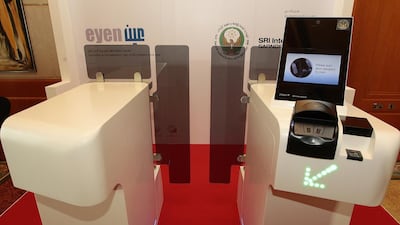DUBAI // Airports in the emirate will soon introduce electronic trolleys that guide passengers to their departure gates with virtually no human interaction.
Travellers will be able to scan their passport to clear immigration control while using a smartphone application to meet their every need.
UAE Vision, a scheme of the Ministry of Interior and the General Directorate of Residency and Foreigners Affairs Dubai, will gather all required information from travellers to ensure a hassle-free voyage.
“It will make a great advancement in passenger processing for both entry and exits,” Thani Alzaffin, director general of emaratech, said yesterday at the opening of the Future of Borders Conference in Dubai.
“It is the core system for the UAE immigration and the backbone of every information flow, from permits issuance on arrival, pre-issuance of permits and border clearance.”
The initiative will be enacted this weekend for FlyDubai passengers in Terminal 2 at Dubai.
“This is the heart of it and where the security lies,” said Mr Alzaffin, adding that the information would be taken from a unified database, the Advanced Passenger Information (API), where all security risks are identified before passengers are allowed to board.
Leila Hareb, assistant director general of strategy and international affairs at the General Civil Aviation Authority, said that centralised personal details would benefit security, customs, airports and ports.
“Data is captured from passports, reservation systems, online bookings, and feeds into the API system,” she said. “Then it is used in immigration, customs, police, ground handlers and airlines.”
Information from Dubai should be completed in a couple of months, followed by Sharjah in summer and the other emirates thereafter.
“We get the information when people apply for a job as the system interfaces with your company online,” Mr Alzaffin said.
“The details are already added for current residents, so this is for when people change jobs or to find out when people are blacklisted.”
Another initiative, Eyen, will simplify border systems.
“It’s a one-stop shop for your engagement with border control, whether an officer or a machine. This will allow you to just use your passport for verification,” Mr Alzaffin said.
The system, to be rolled out this year, will be used on new smart gates, which will all be compatible with Eyen by 2020.
Another upcoming system is a smartphone application for travellers.
“It includes parking, shops you want to visit, your gate, border control and real-time updates, allowing airline and airport operators to reach you easier,” Mr Alzaffin said.
There are also plans for an electronic trolley with touch-screen navigation and guidance.
“You swipe your smartphone on the trolley, place all your bags on it and push it through a security scanner, which will discover liquids and flammables,” he said. “So you don’t have to remove anything.
“This will increase efficiency from an average of 250 passengers an hour to more than 400, although Dubai airport is more efficient than the world average. We are piloting this in Europe this summer.”
Maj Gen Mohammed Al Marri, director general of the directorate, said the objective was to focus on providing the latest technologies for the benefit of travellers.
“Such services will help to ease their travel,” he said. “Hopefully we will come up with results from this conference to help facilitate travel through the borders of the world.”
cmalek@thenational.ae

